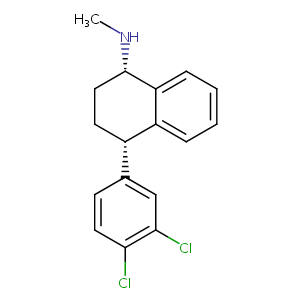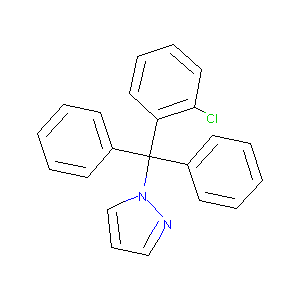| DOT Name |
DOT ID |
UniProt ID |
Mode of Action |
REF |
|
Cytochrome P450 2B6 (CYP2B6)
|
OTOYO4S7
|
CP2B6_HUMAN
|
Decreases Activity
|
[17] |
|
Cytochrome P450 2D6 (CYP2D6)
|
OTZJC802
|
CP2D6_HUMAN
|
Increases ADR
|
[18] |
|
Cytochrome P450 2C19 (CYP2C19)
|
OTFMJYYE
|
CP2CJ_HUMAN
|
Decreases Methylation
|
[19] |
|
ATP-dependent translocase ABCB1 (ABCB1)
|
OTEJROBO
|
MDR1_HUMAN
|
Increases Activity
|
[20] |
|
Phytanoyl-CoA dioxygenase, peroxisomal (PHYH)
|
OTUG4BWA
|
PAHX_HUMAN
|
Increases Expression
|
[5] |
|
Nuclear protein 1 (NUPR1)
|
OT4FU8C0
|
NUPR1_HUMAN
|
Increases Expression
|
[5] |
|
Alpha-1-antichymotrypsin (SERPINA3)
|
OT9BP2S0
|
AACT_HUMAN
|
Increases Expression
|
[5] |
|
Serine protease hepsin (HPN)
|
OT7QNA61
|
HEPS_HUMAN
|
Increases Expression
|
[5] |
|
Fatty acid-binding protein, liver (FABP1)
|
OTR34ETM
|
FABPL_HUMAN
|
Increases Expression
|
[5] |
|
Asparagine synthetase (ASNS)
|
OT8R922G
|
ASNS_HUMAN
|
Increases Expression
|
[5] |
|
Solute carrier family 2, facilitated glucose transporter member 3 (SLC2A3)
|
OT2HZK5M
|
GTR3_HUMAN
|
Decreases Expression
|
[5] |
|
Lanosterol synthase (LSS)
|
OT9W2SFH
|
LSS_HUMAN
|
Increases Expression
|
[5] |
|
Inhibin beta E chain (INHBE)
|
OTOI2NYG
|
INHBE_HUMAN
|
Increases Expression
|
[5] |
|
Transgelin (TAGLN)
|
OTAEZ0KP
|
TAGL_HUMAN
|
Decreases Expression
|
[5] |
|
Acid ceramidase (ASAH1)
|
OT1DNGXL
|
ASAH1_HUMAN
|
Increases Expression
|
[5] |
|
Nuclear receptor subfamily 0 group B member 2 (NR0B2)
|
OT7UVICX
|
NR0B2_HUMAN
|
Increases Expression
|
[5] |
|
Lysophospholipase D GDPD3 (GDPD3)
|
OTOHM9QM
|
GDPD3_HUMAN
|
Increases Expression
|
[5] |
|
Fibronectin type III domain-containing protein 4 (FNDC4)
|
OTOQK0WK
|
FNDC4_HUMAN
|
Increases Expression
|
[5] |
|
Protein DEPP1 (DEPP1)
|
OTB36PHJ
|
DEPP1_HUMAN
|
Increases Expression
|
[5] |
|
Prostaglandin G/H synthase 2 (PTGS2)
|
OT75U9M4
|
PGH2_HUMAN
|
Decreases Expression
|
[21] |
|
Signal transducer and activator of transcription 3 (STAT3)
|
OTAAGKYZ
|
STAT3_HUMAN
|
Decreases Expression
|
[21] |
|
Aromatase (CYP19A1)
|
OTZ6XF74
|
CP19A_HUMAN
|
Decreases Activity
|
[22] |
|
Mitogen-activated protein kinase kinase kinase 13 (MAP3K13)
|
OTS93BTX
|
M3K13_HUMAN
|
Increases Expression
|
[6] |
|
Growth arrest and DNA damage-inducible protein GADD45 beta (GADD45B)
|
OTL9I7LO
|
GA45B_HUMAN
|
Increases Expression
|
[6] |
|
Serine/threonine-protein kinase/endoribonuclease IRE1 (ERN1)
|
OTY9R6FZ
|
ERN1_HUMAN
|
Increases Expression
|
[6] |
|
Protein phosphatase 1 regulatory subunit 15A (PPP1R15A)
|
OTYG179K
|
PR15A_HUMAN
|
Increases Expression
|
[6] |
|
Dual specificity protein phosphatase 14 (DUSP14)
|
OTGODFCR
|
DUS14_HUMAN
|
Increases Expression
|
[6] |
|
Mitogen-activated protein kinase kinase kinase kinase 4 (MAP4K4)
|
OTBMJUOC
|
M4K4_HUMAN
|
Decreases Expression
|
[6] |
|
Epidermal growth factor receptor (EGFR)
|
OTAPLO1S
|
EGFR_HUMAN
|
Increases Expression
|
[6] |
|
Protein c-Fos (FOS)
|
OTJBUVWS
|
FOS_HUMAN
|
Increases Expression
|
[6] |
|
Myc proto-oncogene protein (MYC)
|
OTPV5LUK
|
MYC_HUMAN
|
Increases Expression
|
[6] |
|
Tumor necrosis factor (TNF)
|
OT4IE164
|
TNFA_HUMAN
|
Increases Expression
|
[23] |
|
Alpha-crystallin A chain (CRYAA)
|
OTSN7JUR
|
CRYAA_HUMAN
|
Increases Expression
|
[6] |
|
Albumin (ALB)
|
OTVMM513
|
ALBU_HUMAN
|
Affects Binding
|
[24] |
|
Platelet basic protein (PPBP)
|
OT1FHGQS
|
CXCL7_HUMAN
|
Decreases Expression
|
[25] |
|
Platelet factor 4 (PF4)
|
OTEMJU68
|
PLF4_HUMAN
|
Decreases Expression
|
[7] |
|
Eukaryotic translation initiation factor 2 subunit 1 (EIF2S1)
|
OTM0GDTP
|
IF2A_HUMAN
|
Increases Phosphorylation
|
[6] |
|
Transcription factor Jun (JUN)
|
OTCYBO6X
|
JUN_HUMAN
|
Increases Expression
|
[6] |
|
Transcription factor AP-2-alpha (TFAP2A)
|
OTMYT3NK
|
AP2A_HUMAN
|
Increases Expression
|
[26] |
|
Monocyte differentiation antigen CD14 (CD14)
|
OT83GJ47
|
CD14_HUMAN
|
Decreases Expression
|
[6] |
|
Heat shock 70 kDa protein 1A (HSPA1A)
|
OTKGIE76
|
HS71A_HUMAN
|
Increases Expression
|
[6] |
|
Apoptosis regulator Bcl-2 (BCL2)
|
OT9DVHC0
|
BCL2_HUMAN
|
Decreases Expression
|
[23] |
|
Heat shock cognate 71 kDa protein (HSPA8)
|
OTJI2RCI
|
HSP7C_HUMAN
|
Decreases Expression
|
[6] |
|
Cyclic AMP-dependent transcription factor ATF-2 (ATF2)
|
OTNIZPEA
|
ATF2_HUMAN
|
Increases Expression
|
[6] |
|
P-selectin (SELP)
|
OTWR90PK
|
LYAM3_HUMAN
|
Decreases Expression
|
[25] |
|
Platelet endothelial cell adhesion molecule (PECAM1)
|
OTXOM4D9
|
PECA1_HUMAN
|
Decreases Expression
|
[7] |
|
E-selectin (SELE)
|
OT33RZWY
|
LYAM2_HUMAN
|
Decreases Expression
|
[25] |
|
Stathmin (STMN1)
|
OTDJ4RV0
|
STMN1_HUMAN
|
Decreases Expression
|
[6] |
|
Heat shock 70 kDa protein 6 (HSPA6)
|
OTH4S7WB
|
HSP76_HUMAN
|
Increases Expression
|
[6] |
|
Transcription factor JunD (JUND)
|
OTNKACJD
|
JUND_HUMAN
|
Increases Expression
|
[6] |
|
Cyclic AMP-dependent transcription factor ATF-4 (ATF4)
|
OTRFV19J
|
ATF4_HUMAN
|
Increases Expression
|
[6] |
|
Nuclear factor NF-kappa-B p105 subunit (NFKB1)
|
OTNRRD8I
|
NFKB1_HUMAN
|
Increases Expression
|
[6] |
|
Ribosomal protein S6 kinase beta-1 (RPS6KB1)
|
OTAELNGX
|
KS6B1_HUMAN
|
Decreases Phosphorylation
|
[8] |
|
Growth arrest and DNA damage-inducible protein GADD45 alpha (GADD45A)
|
OTDRV63V
|
GA45A_HUMAN
|
Increases Expression
|
[6] |
|
Mitogen-activated protein kinase 3 (MAPK3)
|
OTCYKGKO
|
MK03_HUMAN
|
Increases Phosphorylation
|
[23] |
|
Mitogen-activated protein kinase 1 (MAPK1)
|
OTH85PI5
|
MK01_HUMAN
|
Increases Phosphorylation
|
[23] |
|
Dual specificity protein phosphatase 1 (DUSP1)
|
OTN6BR75
|
DUS1_HUMAN
|
Increases Expression
|
[6] |
|
DNA damage-inducible transcript 3 protein (DDIT3)
|
OTI8YKKE
|
DDIT3_HUMAN
|
Increases Expression
|
[6] |
|
Mitogen-activated protein kinase kinase kinase 8 (MAP3K8)
|
OTOZTA1F
|
M3K8_HUMAN
|
Increases Expression
|
[6] |
|
Serine/threonine-protein kinase mTOR (MTOR)
|
OTHH8KU7
|
MTOR_HUMAN
|
Decreases Phosphorylation
|
[8] |
|
Caspase-3 (CASP3)
|
OTIJRBE7
|
CASP3_HUMAN
|
Increases Activity
|
[6] |
|
Translocon-associated protein subunit beta (SSR2)
|
OTQJSL7M
|
SSRB_HUMAN
|
Increases Expression
|
[6] |
|
Caspase-4 (CASP4)
|
OTVQTV1L
|
CASP4_HUMAN
|
Increases Cleavage
|
[6] |
|
Ribosomal protein S6 kinase alpha-3 (RPS6KA3)
|
OTYJNNMD
|
KS6A3_HUMAN
|
Decreases Expression
|
[6] |
|
Caspase-7 (CASP7)
|
OTAPJ040
|
CASP7_HUMAN
|
Increases Activity
|
[6] |
|
Protein transport protein Sec61 subunit gamma (SEC61G)
|
OT7MJRXY
|
SC61G_HUMAN
|
Decreases Expression
|
[6] |
|
E3 ubiquitin-protein ligase RBX1 (RBX1)
|
OTYA1UIO
|
RBX1_HUMAN
|
Decreases Expression
|
[6] |
|
S-phase kinase-associated protein 1 (SKP1)
|
OT5BPAZ4
|
SKP1_HUMAN
|
Decreases Expression
|
[6] |
|
Nuclear factor NF-kappa-B p100 subunit (NFKB2)
|
OTS231V7
|
NFKB2_HUMAN
|
Increases Expression
|
[6] |
|
Transcription factor RelB (RELB)
|
OTU3QYEF
|
RELB_HUMAN
|
Increases Expression
|
[6] |
|
Induced myeloid leukemia cell differentiation protein Mcl-1 (MCL1)
|
OT2YYI1A
|
MCL1_HUMAN
|
Decreases Expression
|
[23] |
|
Potassium voltage-gated channel subfamily H member 2 (KCNH2)
|
OTZX881H
|
KCNH2_HUMAN
|
Decreases Activity
|
[27] |
|
Acetyl-CoA carboxylase 1 (ACACA)
|
OT5CQPZY
|
ACACA_HUMAN
|
Increases Phosphorylation
|
[8] |
|
Dual specificity protein phosphatase 8 (DUSP8)
|
OTPLMPG9
|
DUS8_HUMAN
|
Increases Expression
|
[6] |
|
Sequestosome-1 (SQSTM1)
|
OTGY5D5J
|
SQSTM_HUMAN
|
Increases Expression
|
[8] |
|
Cullin-1 (CUL1)
|
OTXPE1UZ
|
CUL1_HUMAN
|
Decreases Expression
|
[6] |
|
Homocysteine-responsive endoplasmic reticulum-resident ubiquitin-like domain member 1 protein (HERPUD1)
|
OT9EROL6
|
HERP1_HUMAN
|
Increases Expression
|
[6] |
|
Serine/threonine-protein kinase STK11 (STK11)
|
OT1YZSP3
|
STK11_HUMAN
|
Increases Phosphorylation
|
[8] |
|
Nuclear factor erythroid 2-related factor 2 (NFE2L2)
|
OT0HENJ5
|
NF2L2_HUMAN
|
Increases Expression
|
[6] |
|
E3 ubiquitin-protein ligase synoviolin (SYVN1)
|
OTZ4ZJP5
|
SYVN1_HUMAN
|
Increases Expression
|
[6] |
|
Dual specificity protein phosphatase 16 (DUSP16)
|
OTK7S078
|
DUS16_HUMAN
|
Increases Expression
|
[6] |
|
Microtubule-associated proteins 1A/1B light chain 3B (MAP1LC3B)
|
OTUYHB84
|
MLP3B_HUMAN
|
Increases Lipidation
|
[8] |
|
DnaJ homolog subfamily C member 5 (DNAJC5)
|
OTCZDXAL
|
DNJC5_HUMAN
|
Increases Expression
|
[28] |
|
Eukaryotic translation initiation factor 2-alpha kinase 3 (EIF2AK3)
|
OT0DZGY4
|
E2AK3_HUMAN
|
Increases Expression
|
[6] |
|
Serine/threonine-protein kinase TAO2 (TAOK2)
|
OTNUMOZ1
|
TAOK2_HUMAN
|
Increases Expression
|
[6] |
|
C-Jun-amino-terminal kinase-interacting protein 3 (MAPK8IP3)
|
OT0X8ACY
|
JIP3_HUMAN
|
Increases Expression
|
[6] |
|
Dual specificity protein phosphatase 10 (DUSP10)
|
OTNG467B
|
DUS10_HUMAN
|
Increases Expression
|
[6] |
|
Sodium-dependent serotonin transporter (SLC6A4)
|
OT6FGDLW
|
SC6A4_HUMAN
|
Increases Response To Substance
|
[29] |
| ------------------------------------------------------------------------------------ |
|
|
|
|


